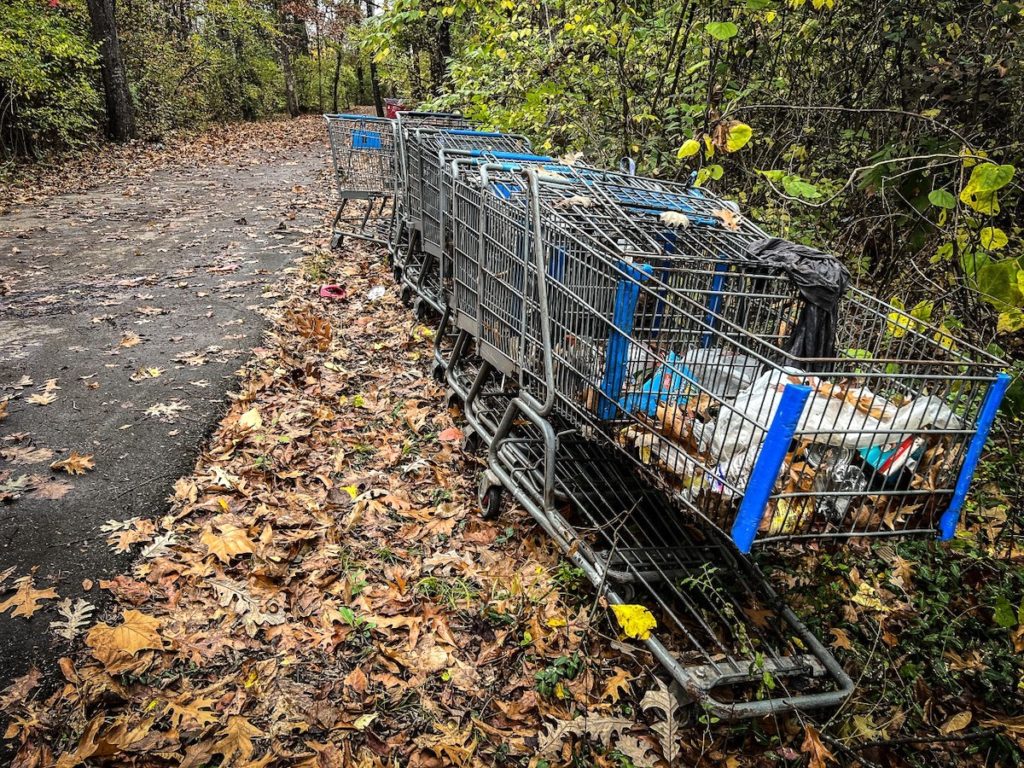
Newly posted signs at Brookmeade Park in West Nashville declare Jan. 4 is the closing date when renovations will begin. That’s the deadline for people living there to find somewhere else to go.
The city estimates more than 40 people live in Brookmeade, and that there have been multiple serious crime and safety issues at the park – particularly over this calendar year. It has approved two contracts to expand access to temporary housing options before that date comes, as well as ongoing services to help increase the chance of long-term housing success.
One Brookmeade Park resident, Bizcut, has called the park her home for the past five years. We’re using her chosen name because of safety concerns.
She says she was scared when she got the official camp closing date, but she’s willing to leave.
“I’m happy to move out if they give us something to go to,” she says.
That “something to go to” is likely temporary – or “gap” – housing that begins with one of two organizations with long track records at the camp — The Salvation Army and Community Care Fellowship — affectionately known as “Ken & Carol’s”.
“The key to what we do is building that trusting relationship and never giving up,” says Salvation Army Captain Philip Canning.
He says they’ll be mostly offering rooms in a hotel and he understands the mixed feelings people might have about leaving the campsite.
“If you and I were to get an eviction notice from our current living arrangement, and be forced to move because of a decision that was outside of our control…it’s not fun,” he says. “It’s not easy to accept.”
 Courtesy of Bizcut.
Courtesy of Bizcut. Brookmeade Park resident Bizcut (right) shares a selfie with former park resident Jake who passed away after getting permanent housing.
The goal of a transitional housing option, like the hotel, is to give people somewhere to stay for what officials hope is only about three to four months between living outdoors and a permanent place.
“So gap housing just fills that gap in that timeframe,” says Canning.
Ryan LaSuer, from Community Care Fellowship, says this kind of program is just an extension of the mission Ken & Carol’s was founded on in the 1970’s.
“We need to create space where we can build relationship and intentionally love on our neighbors, and that’s what we carry on now, is creating those spaces,” he says. It’s a “hyper-local approach of utilizing resource hubs throughout the city.”
So, over the last year, they’ve been creating temporary housing – mostly in churches in areas of town close to larger campsites and other significant need.
Community Care’s new city contract allows them to open more of these spaces and focus on homeless families – which LaSuer says they’ve been seeing an “explosion” of. He hopes they can help take some of the pressure off other nonprofits like the Nashville Rescue Mission.
He also emphasizes the need for long-term ongoing support beyond just permanent housing.
“Statistics are very high after that first year of people falling out of housing because they don’t have that network of support,” LaSuer says.
Bizcut’s main hope is that her camp network can survive this change. She says she wants camp residents to get housing placement close together.
“We’re all a family out here. We don’t wanna separate,” she says. “If we have a question about camping, we go to JB. If we have a question about sickness, we used to go to Chief before he passed away. Wendy, she’s like our big sister, you know? Everybody knows everybody,” she says, “and we are just a little scared.”
Like Canning and LaSuer, Bizcut says she believes in the bonds she’s formed with service providers.
“I know these people that are helping us are not gonna leave us out here,” she says.

